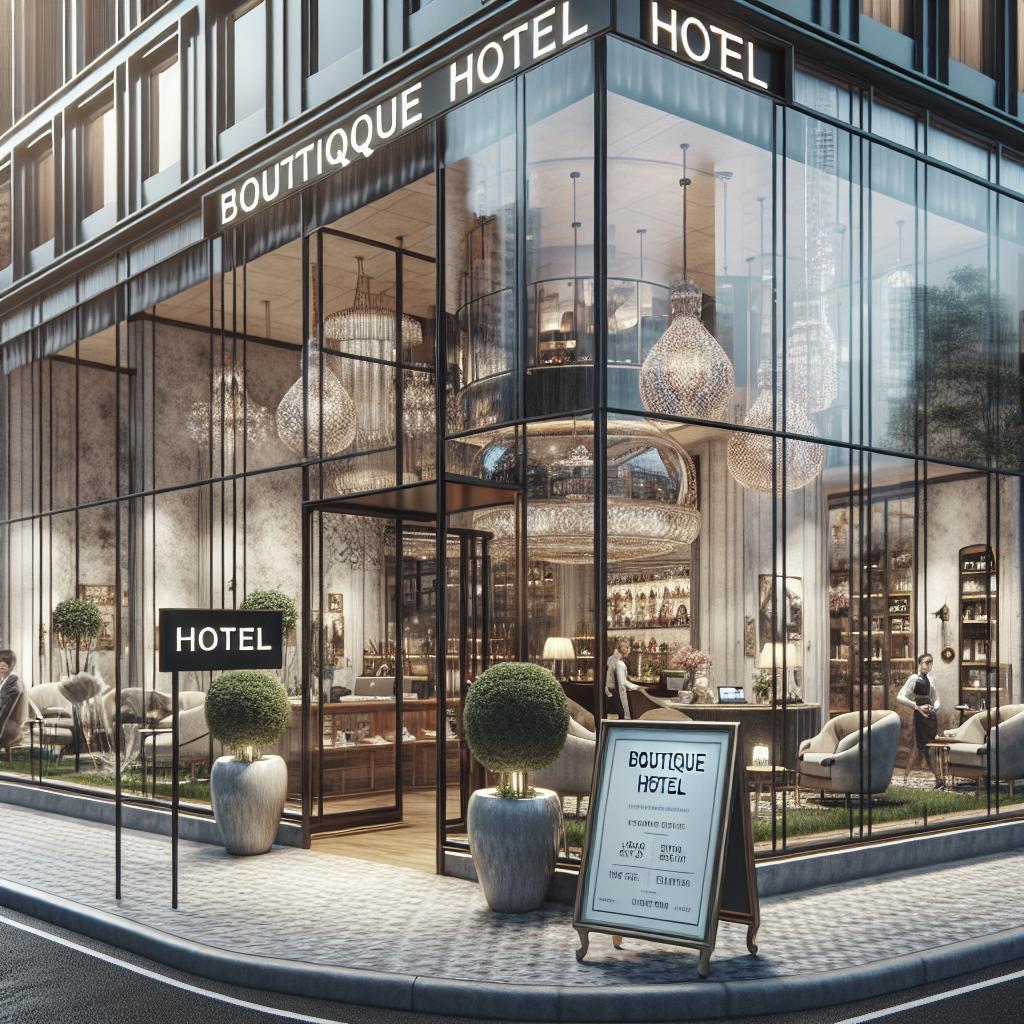Characteristics of Boutique Hotels: A Comprehensive Guide
Boutique hotels offer a unique and personalized lodging experience, setting them apart from mainstream hotel chains. Emphasizing individuality, distinct themes, and often reflecting the local culture, these hotels cater to those seeking an unconventional stay. In this post, we will delve into what defines a boutique hotel, explore their historical evolution, highlight their distinguishing features, and examine why travelers are increasingly drawn to these exclusive venues. We will also differentiate boutique hotels from regular hotels in terms of location, size, personal service, and design, concluding with some of the frequently asked questions and strategic marketing insights for these niche accommodations.
What are boutique hotels? Discover everything you need to know
Boutique hotels are an intriguing segment within the hospitality industry known for their nonconformity and intimate settings. Unlike large chain hotels, boutique hotels focus on providing unique experiences that are often styled around a specific theme or catered to a niche market. They are characterized by their smaller size, personalized services, and local flavor, making each stay memorable and often luxurious.
The essence of boutique hotels lies in their ability to offer customized experiences, often incorporating elements that reflect the culture and character of their surroundings. They are particularly appealing for travelers looking for more than just a place to sleep, offering a distinct personal touch and a home-like atmosphere.
What makes a hotel boutique?
What is a boutique hotel?
A boutique hotel is defined by its inherent uniqueness and commitment to personalization. Typically small in size, with fewer than 100 rooms, boutique hotels focus on creating an intimate ambiance. The emphasis is not just on the physical structure or its stylish interior; it is about an experience that is tailored to the guests’ preferences.
Beyond size, they often feature distinctive architectural design and décor. The integration of local art, artisanal crafts, and region-specific gourmet offerings are common features designed to immerse guests in the locale. Most importantly, the service level is exceptionally personalized, often leading to lasting relationships between guests and staff.
Characteristics of a boutique hotel
The defining characteristics of boutique hotels include distinct design aesthetics, personalized service, and a focus on creating an immersive experience. Unlike the cookie-cutter rooms in larger chain hotels, boutique accommodations are known for their artistic flair and attention to detail, highlighting the personality and story behind each property.
Besides the decor, a hallmark of boutique hotels is their service model, which is highly personalized. Staff are trained to anticipate the needs of guests, offering bespoke services tailored to individual preferences, whether it’s recommendations for local attractions, personalized dining experiences, or custom room arrangements.
The history of boutique hotels
The concept of a boutique hotel emerged in the late 20th century as a reaction to the standardization of hotel chains. They were introduced as an alternative to the impersonal and uniform experience offered by larger hotel groups. Pioneers of the luxe boutique format aimed to create one-of-a-kind properties with unique identities, each telling its own story.
Clarion Bedford Hotel
One of the earliest examples of a contemporary boutique hotel is the Clarion Bedford Hotel in San Francisco. It opened in the 1980s and set a precedent with its unique offerings and personalized guest services. The hotel’s reputation grew for its attention to individual guest preferences and its commitment to reflecting the local culture through its décor and events.
Morgans Hotel
The Morgans Hotel in New York City, conceptualized by Ian Schrager and designed by Steve Rubell, is another iconic example. Launched in 1984, it is often credited as the starting point of the boutique hotel boom. It introduced the concept of lifestyle marketing in accommodations by focusing on trendy design and cutting-edge hospitality services, creating a model that many have followed.
How do boutique hotels differ from other hotels?
Location
Location plays a vital role in distinguishing boutique hotels from their counterparts. These accommodations are often strategically placed in vibrant city centers or emerging neighborhoods, allowing guests to immerse themselves in local culture, cuisine, and events. Proximity to landmarks, attractions, and local neighborhoods adds to the allure and convenience for travelers.
Size
The smaller size of boutique hotels usually contributes to their charm and exclusivity. With a typical range of 10 to 100 guest rooms, these hotels can focus more intimately on each guest’s needs. The compact size allows for distinct architectural elements, more thoughtful and meticulous design, and often enables a more controllable and warm guest interaction environment.
Services
Service at a boutique hotel goes beyond mere functionality; it emphasizes personalization. Staff members are often trained to deliver individualized attention, with a customer-first approach tailored to personal preferences and desires. Unlike the standardized services in larger chains, boutique hotels often feature concierge experiences, unique room service menus, and events that contribute to a bespoke guest experience.
Decor and design
Boutique hotels typically showcase innovative design and décor, often incorporating local artistry, unique layouts, and unconventional themes. The attention to detail in these establishments can be seen in everything from handpicked furniture pieces to locally sourced materials. This emphasis on aesthetics and design ensures that the hotel’s environment complements and enhances the guest experience.
Why are boutique hotels appealing to travelers?
Boutique hotels appeal to travelers for their ability to offer unique, meaningful, and culturally embedded experiences. Many travelers seek accommodations that serve as a microcosm of the local culture, seeking something more immersive than what standard hotel chains offer. Boutique hotels provide this through their tailored services, unique design elements, and locality-focused experiences.
Additionally, boutique hotels maintain an emphasis on quality over quantity, ensuring a focus on the guest experience, which often results in higher guest satisfaction and repeat patronage. For those looking for an environment that combines comfort with uniqueness, boutique hotels are the preferred choice.
Examples of popular boutique hotels
Some boutique hotels have set benchmarks in the industry and continue to exemplify what makes these accommodations so desirable. For instance, the Ace Hotel in New York is renowned for its trendy and artsy atmosphere, drawing inspiration from the vibrant surrounding culture and art scene.
The NoMad Hotel in Paris is another exemplary boutique lodging solution, combining historical architecture with modern luxury, offering guests a lavish yet unique stay. These hotels stand as examples of how boutique accommodations can offer a picturesque blend of creativity, design, service, and hospitality.
Frequently asked questions about boutique hotels
Are boutique hotels better than “regular” hotels?
The determination of ‘better’ often depends on what a traveler is looking for in their accommodation. For travelers seeking a unique experience that goes beyond conventional stays, boutique hotels often rate higher. The emphasis is on personalization, character, and charm which many find to be lacking in larger chain hotels.
Are boutique hotels more expensive?
While boutique hotels may often attract premium pricing compared to mid-range chain options, they also offer experiences that justify the price, such as personalized services, themed environments, and often, central location benefits. Overall affordability can vary significantly, depending on location, offered services, and brand reputation.
Why are boutique hotels successful?
Boutique hotels are successful largely due to their focused guest experience strategy. They capitalize on the desire for unique, authentic experiences, ensuring participants in significant growth seen in recent decades. Their appeal lies in the uniqueness they offer, which also cultivates a high rate of repeat business and loyal clientele.
What’s so unique about a boutique hotel?
The uniqueness of boutique hotels is partly rooted in their setting and delivery—incorporating local flavors, custom décor, and tailored guest service packages. Unlike chain hotels that prioritize standardization, each boutique hotel tells its own story and invites guests to immerse themselves in a specific cultural atmosphere.
How should you market a boutique hotel?
Effective marketing for a boutique hotel should highlight its unique characteristics and personalized service offerings. Digital marketing strategies often include social media engagement, influencer partnerships and showcasing user-generated content which reflects guest experiences. Storytelling via content marketing can also be powerful, emphasizing the unique aspects of the hotel’s history, design, and location.
Now you know everything about boutique hotels!
By understanding these facets of boutique hotels, you can fully appreciate the rich diversity they contribute to the hospitality industry. As the trend towards personalized travel experiences continues to grow, boutique hotels are well-aligned with the desires of contemporary travelers, ensuring their ongoing success and appeal.
More Reading
For further insights into boutique hotels and the broader hospitality industry, consider reading more about the impact of digital technologies, local cultural integration in hotel experiences, and the evolution of hotel service standards.
| Aspect | Description |
|---|---|
| What are boutique hotels? | Small, unique hotels focusing on personalized experiences and local flavor. |
| History | Origins in the late 20th century as alternatives to standardized chain hotels. |
| Distinguishing features | Location, size, tailored services, and unique design. |
| Traveler appeal | Offers unique, meaningful, culturally embedded experiences. |
| FAQ insights | Discusses cost, uniqueness, and marketing strategies for boutique hotels. |


